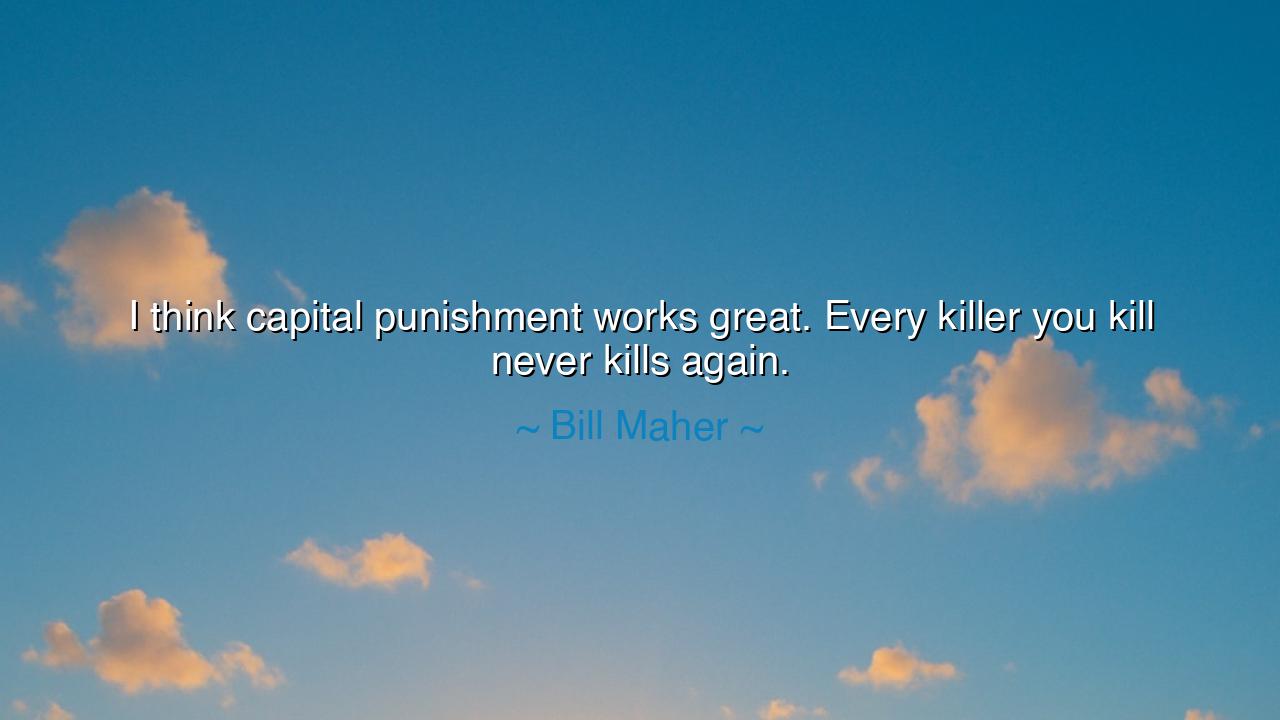
I think capital punishment works great. Every killer you kill






“I think capital punishment works great. Every killer you kill never kills again.”
Thus spoke Bill Maher, the modern provocateur, whose words cut with the brevity of truth wrapped in irony. At first glance, they appear blunt — even crude — yet beneath this sharpness lies a profound meditation on justice, consequence, and human mortality. Maher’s statement reflects the stark logic of action and result: in the cycle of life and death, one certainty remains immutable — the life taken cannot take another. In this lies both a caution and a reflection on the weight of human judgment.
The origin of this quote emerges from the contentious discourse surrounding capital punishment, a practice debated through centuries of human law and morality. In Maher’s quip, there is humor, yet also a grim acknowledgement of the finality of justice. Since time immemorial, societies have grappled with the question of retribution versus mercy, punishment versus rehabilitation. From the Hammurabi Code of Babylon to the medieval courts of Europe, the principle that certain crimes demand irrevocable consequence has persisted, though always shadowed by the tension between morality and expediency. Maher, in his modern lens, observes the simple certainty: a life ended prevents that life from committing further harm.
The ancients understood this tension in both law and philosophy. Plato, in his Laws, considered the balance between justice and mercy, pondering how the state might preserve order while cultivating virtue. Likewise, Cicero wrote that society’s greatest duty is to protect the innocent, yet he cautioned that punishment must reflect both fairness and foresight. Maher’s words, stripped to their core, echo this ancient contemplation: they recognize the utility of prevention while simultaneously provoking reflection on the moral cost of absolute action.
History provides a litany of examples. The execution of Socrates, though unjust in its context, illustrates the complex interplay between societal law, perceived crime, and consequence. He drank the hemlock, never to teach again, yet his death propagated thought rather than extinguishing it. Conversely, historical criminals whose actions went unchecked — such as serial offenders in various societies — highlight Maher’s literal observation: without intervention, destructive acts repeat, imperiling countless lives. His statement forces us to confront the binary nature of life and death, and the moral calculus that every society must wrestle with.
Yet Maher’s logic is both ironic and reductive, which is precisely its power. He presents capital punishment as absolute prevention, a darkly humorous truth in the simplicity of its statement: once a killer is dead, they cannot kill again. However, it is a statement that invites reflection on the broader consequences of human action — the ethical, social, and emotional ramifications of ending a life intentionally. History reminds us that punishment, while necessary in some form, must weigh human dignity, justice, and the fallibility of judgment.
In the modern age, this tension remains stark. Consider the case of Ted Bundy, whose execution in 1989 ended his spree of horrific crimes. While society experienced relief, the act of execution also provoked moral debate about whether vengeance satisfies justice or merely perpetuates the cycle of death. Maher’s quote, in its brevity, captures the pragmatic clarity of such finality, yet also challenges us to reflect on the complex human consequences that extend beyond mere prevention.
The lesson, then, is not solely about punishment, but about the recognition of consequence. Every action carries a ripple — some small, some catastrophic. Maher’s words, though humorous, remind us that life is fragile, that choices matter, and that society constantly balances security, morality, and mercy. It is a meditation on the weight of decision, the permanence of action, and the responsibility inherent in wielding power over life and death.
Thus, as we reflect on Maher’s words, let us consider both the literal and the philosophical: the certainty of consequence is a tool, but the wisdom to wield it is a virtue. In life, as in law, one must act with clarity, foresight, and humility. For while ending a life may prevent further harm, the act itself reverberates through the hearts and minds of the living. And in that reflection, humanity finds the eternal struggle: to seek justice without losing the moral compass that defines us.






AAdministratorAdministrator
Welcome, honored guests. Please leave a comment, we will respond soon